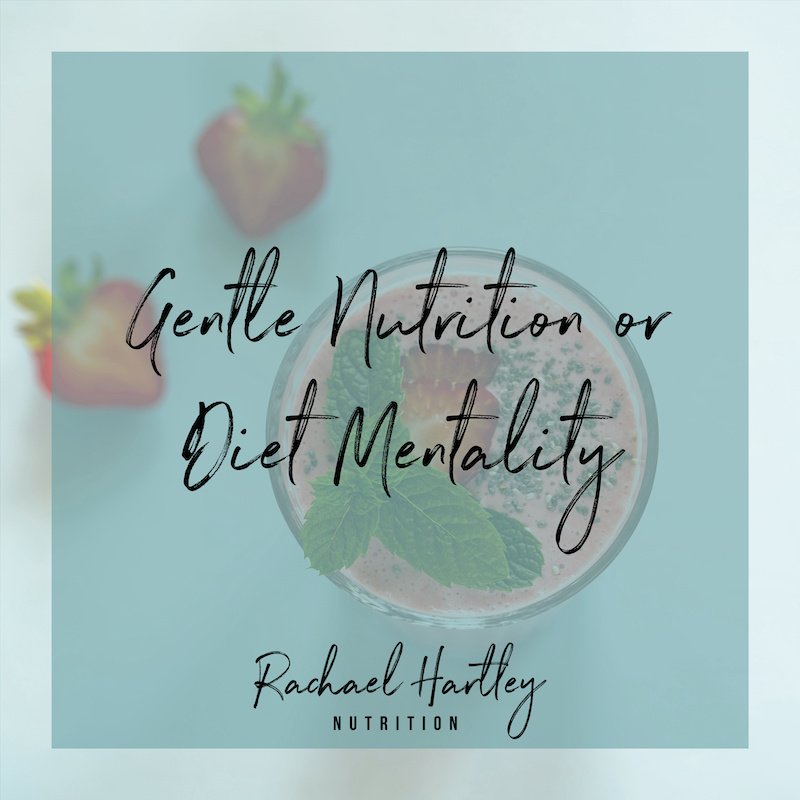Table of Contents

Health has long been associated with affluence and social status, and this has become even more heightened in our social media age, where we can curate the image of health and wellness. When someone posts a picture of themselves going for a workout in trendy and expensive athleisure they gain social capital, regardless of their actual health status or motivation for exercise. When someone decides to eat a “healthy” food or follow a specific eating plan, it genuinely might not have much to do with weight loss. It may have more to do with gaining social capital, performing health, fear of “doing things wrong” and getting sick, or fitting in with people around them. But if there’s shame, restriction and deprivation involved, does it really matter that weight loss isn’t the main motivator?
As you can see, distinguishing gentle nutrition from diet mentality is far from clear cut. When I work with clients on gentle nutrition, we focus on the intentions behind a food choice just as much as the food choice itself. This is where it can get really clear whether a choice is stemming from a genuine desire to improve health and wellbeing, or if diet mentality is driving the decision.
Here’s 6 questions I like to ask:
Gentle Nutrition or Diet Mentality?
Is it for wellbeing or weight loss?
Perhaps the most important question in distinguishing gentle nutrition from diet mentality. Sometimes the answer to this question is clear, other times less so. If the latter, I’ll often follow it up with questions like:
Is the change rigid or flexible?
Any dietary change made to improve wellbeing must be flexible enough to allow you to live life in a way that feels good to you. There may be some exceptions – if you have a severe allergy, celiac, or similar, clearly there may be times your dietary needs impact life. But for the most part, there are very few medical conditions with dietary needs that don’t allow for flexibility. This is especially true when it comes to pursuit of general health and wellbeing. I repeat, there is no need for rigid food rules or strictly eliminating foods/food groups if your goal is to improve general health. For most medical conditions, it’s the same.
Is it for self care or self control?
When you think of the intention of the food choice, is the focus on caring for your body, or trying to control it? This may feel like an odd exercise, but when you think about making the change/decision, consider what kind of parent you connect with. Does it feel like it’s stemming from an authoritative parent, or a nurturing one?
Is it individualized or one-size-fits-all?
Think about the diet and nutrition books you’ve read or programs you’ve followed. Most, if not all, prescribe one-size-fits-all advice. Everyone reading the book is told to do the same thing, no matter their individual food and nutrition needs, food preferences, lifestyle, activity levels, medical conditions, etc. Gentle nutrition should always be adapted to you and your individual needs and wants.
Is it focused on adding or subtracting?
Gentle nutrition is usually focused on adding nutrition in, while dieting is focused on taking foods out. Dietitian Paige Smathers has coined the phrase positive nutrition, and I really like that phrase. This aligns with my nutrition hierarchy of needs, which posits that eating enough food is the most important aspect of nutrition.
Is it focused on the big picture or individual meals and snacks?
Diets typically micromanage individual meals and snacks, trying to get them to fit into their rigid ideal or rules. Gentle nutrition zooms out on eating patterns over time and focuses on making changes that impact the big picture. Here’s an example of how a diet and gentle nutrition might approach the same general goal: eating more fruits and vegetables.
Diet: Eat X servings of fruits and X servings of vegetables every day
Gentle nutrition: Come up with a list of 4-5 snacks you actually like that also include produce, and try to have at least a couple of those around at all times (sidebar: I’m currently obsessing over sweet and savory cottage cheese snacks, like cottage cheese with mango and honey and cottage cheese with diced cucumbers, a drizzle of olive oil, and salt).





More Stories
United Healthcare’s ransomware attack shows why supply chains are under siege
Nutrition Tips For Ramadan | JM Nutrition
Probiotics for IBS | The Nutritionist Reviews